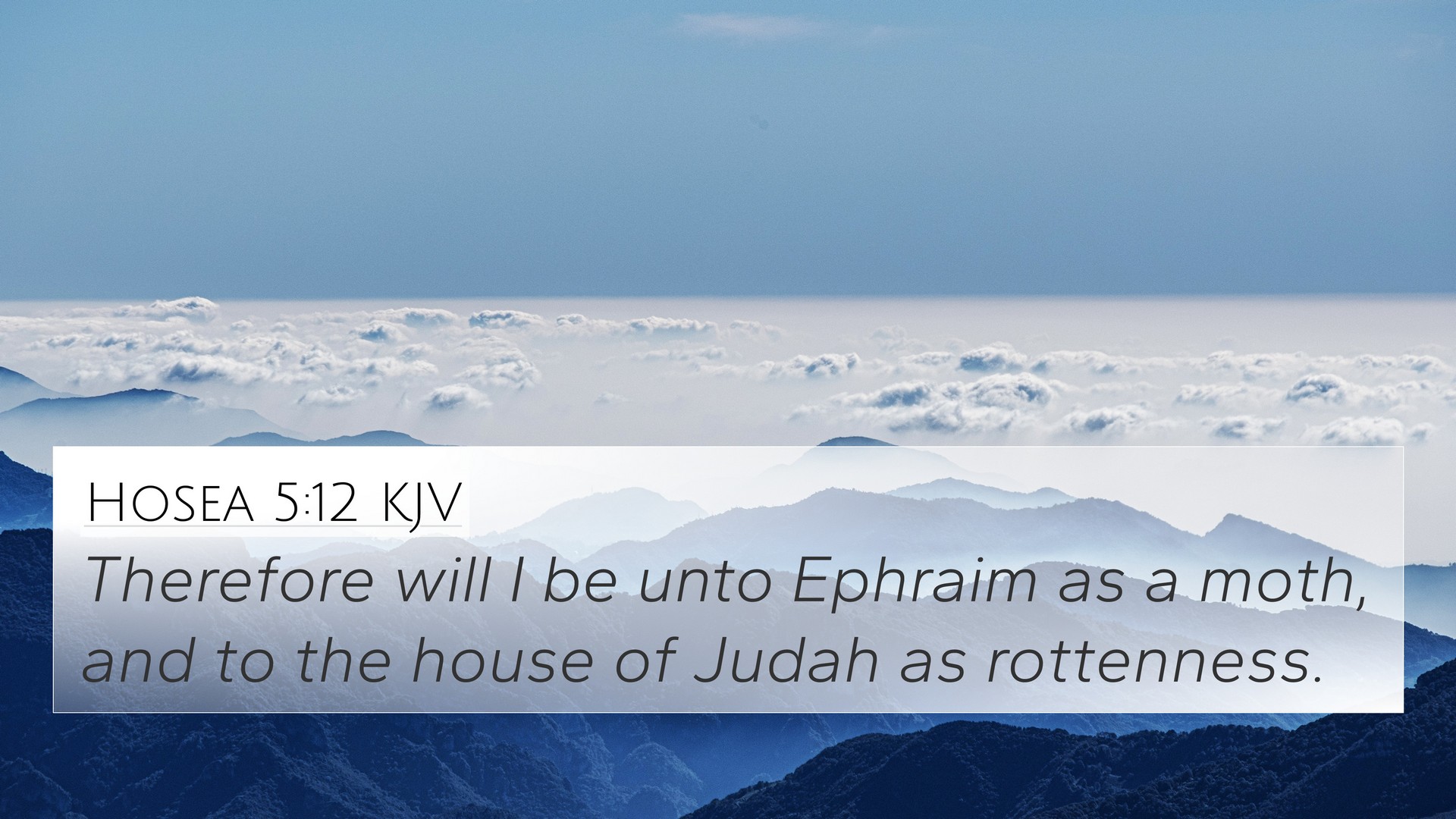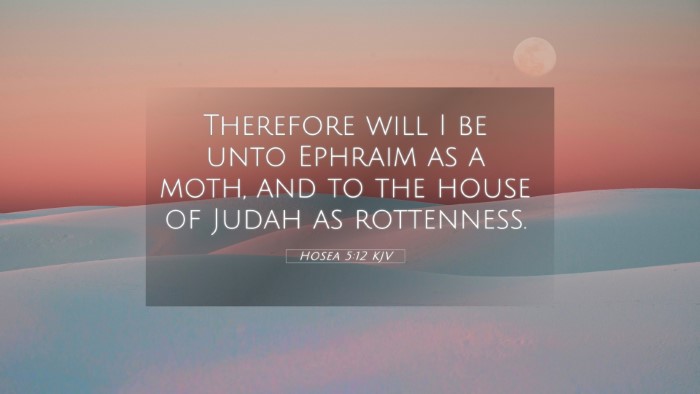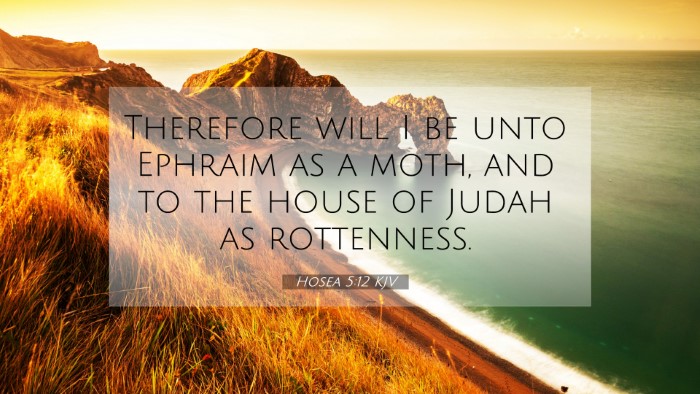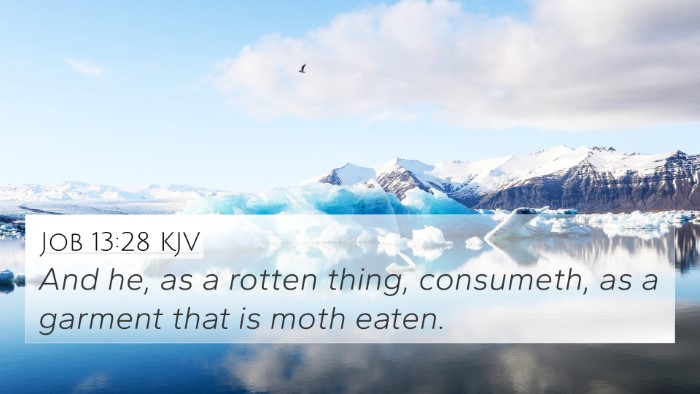Old Testament
Genesis Exodus Leviticus Numbers Deuteronomy Joshua Judges Ruth 1 Samuel 2 Samuel 1 Kings 2 Kings 1 Chronicles 2 Chronicles Ezra Nehemiah Esther Job Psalms Proverbs Ecclesiastes Song of Solomon Isaiah Jeremiah Lamentations Ezekiel Daniel Hosea Joel Amos Obadiah Jonah Micah Nahum Habakkuk Zephaniah Haggai Zechariah MalachiHosea 5:12 Similar Verses
Hosea 5:12 Cross References
Therefore will I be unto Ephraim as a moth, and to the house of Judah as rottenness.
Uncover the Rich Themes and Topics of This Bible Verse
Listed below are the Bible themes associated with Hosea 5:12. We invite you to explore each theme to gain deeper insights into the Scriptures.
Hosea 5:12 Cross Reference Verses
This section features a detailed cross-reference designed to enrich your understanding of the Scriptures. Below, you will find carefully selected verses that echo the themes and teachings related to Hosea 5:12 KJV. Click on any image to explore detailed analyses of related Bible verses and uncover deeper theological insights.
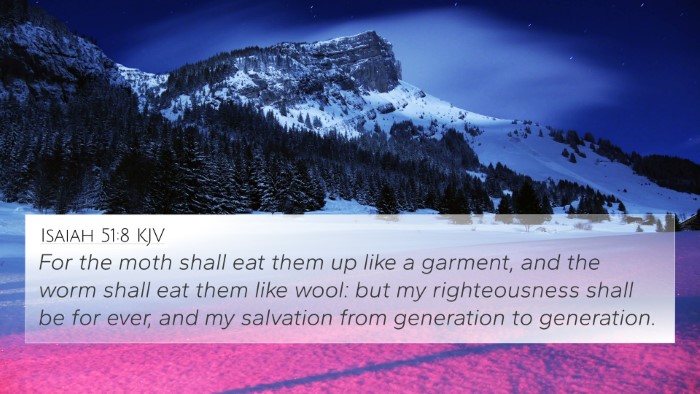
Isaiah 51:8 (KJV) »
For the moth shall eat them up like a garment, and the worm shall eat them like wool: but my righteousness shall be for ever, and my salvation from generation to generation.
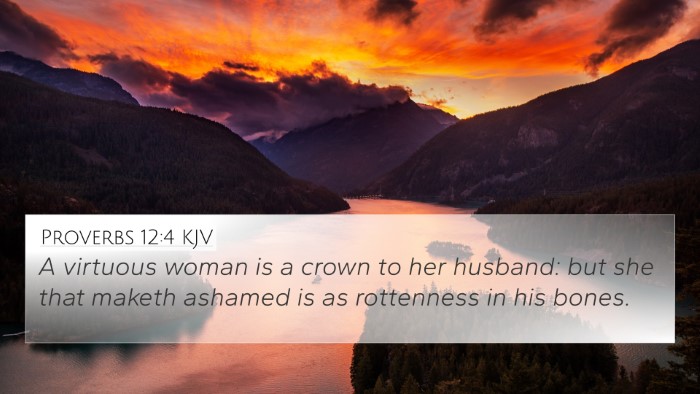
Proverbs 12:4 (KJV) »
A virtuous woman is a crown to her husband: but she that maketh ashamed is as rottenness in his bones.
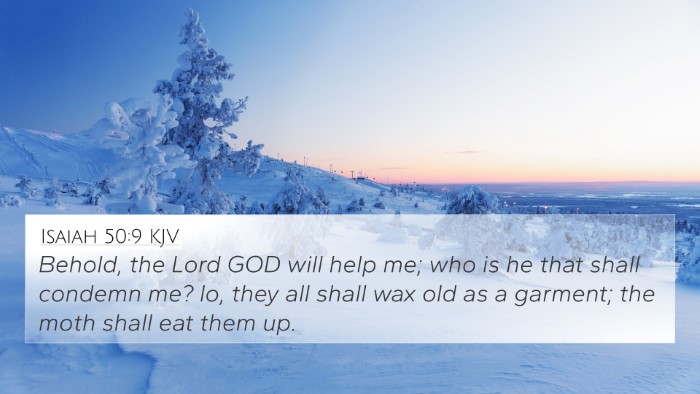
Isaiah 50:9 (KJV) »
Behold, the Lord GOD will help me; who is he that shall condemn me? lo, they all shall wax old as a garment; the moth shall eat them up.
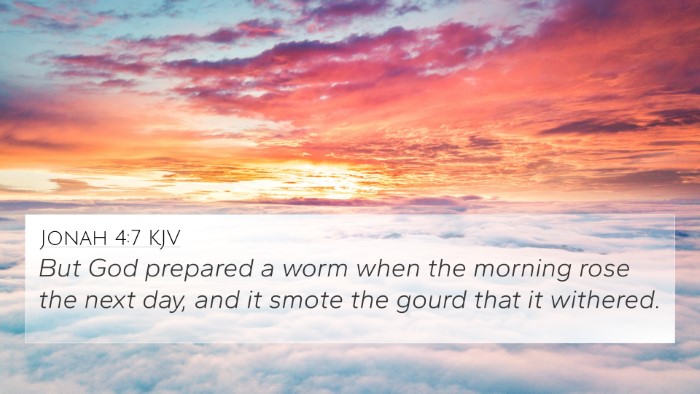
Jonah 4:7 (KJV) »
But God prepared a worm when the morning rose the next day, and it smote the gourd that it withered.
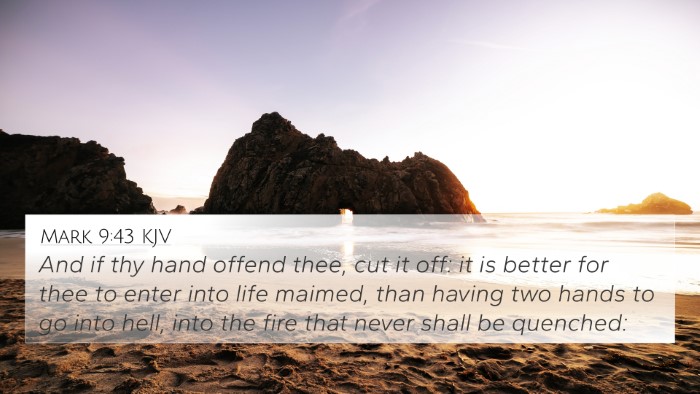
Mark 9:43 (KJV) »
And if thy hand offend thee, cut it off: it is better for thee to enter into life maimed, than having two hands to go into hell, into the fire that never shall be quenched:
Hosea 5:12 Verse Analysis and Similar Verses
Understanding Hosea 5:12
Bible Verse: Hosea 5:12
"Therefore will I be unto Ephraim as a moth, and to the house of Judah as rottenness."
Interpretation and Meaning
The verse Hosea 5:12 presents a profound insight into the consequences of Israel's disobedience and sinfulness. The imagery employed by the prophet Hosea, referring to God as a moth to Ephraim and rottenness to Judah, emphasizes the nefarious effects of decay and destruction that ensue from distance from God.
Key Themes
- Divine Judgment: The comparison of God to a moth and rottenness illustrates how sin leads to degradation and judgment.
- Spiritual Decay: The text emphasizes the gradual spiritual decline of Israel, revealing the nature of sin as ultimately self-destructive.
- Repentance and Restoration: Implicit in the warning is the call for the people to turn back to God to avert further decay.
Commentary Insights
Matthew Henry: Henry considers the metaphorical representation of God’s presence as a destructive force towards the unrepentant heart. His commentary indicates that just as moths consume garments, so too will God’s judgment consume the pride and false security of His people.
Albert Barnes: Barnes elaborates on the nature of rottenness, signifying spiritual deterioration. He opens a discussion on the inevitability of God’s response to sin and the resultant harm to the nation of Israel, indicating that God’s presence—when ignored—becomes harmful to those who rebel.
Adam Clarke: Clarke’s analysis reflects on the historical context of Israel and Judah, drawing attention to how these figures signify broader spiritual truths. He articulates the idea that the prophet is expressing God’s displeasure with the state of His people, highlighting the need for a return to righteousness.
Cross-Referenced Bible Verses
To enrich our understanding, the following verses relate to the themes presented in Hosea 5:12:
- Isaiah 33:14: Discusses the fear of the Lord as a consuming fire that brings about judgment, echoing the aspects of decay represented in Hosea.
- James 5:1-3: Warns the rich about the rust and moth that destroy their treasures, linking material decay with spiritual emptiness.
- Matthew 6:19-20: Jesus teaches about not storing treasures on earth, where moth and rust destroy, reinforcing the transitory nature of earthly security.
- Ezekiel 18:30: Calls Israel to repentance, signifying a necessary action to avoid the destructive outcomes spoken of by Hosea.
- Proverbs 5:22: Indicates the snare of ungodly behavior leading to inevitable decay in a person’s life.
- 1 Peter 1:24: Quotes Isaiah about the fading nature of flesh like grass, affirming the universal truth about human deliverance through God's word.
- Galatians 6:7: Emphasizes reaping what one sows, aligning with the consequences detailed in Hosea's prophetic view.
- Revelation 3:17: Speaks of spiritual blindness and wealth leading to downfall, mirroring the call for reflection and repentance in Hosea's message.
- Hosea 6:1: A direct call to repentance, emphasizing the need for Israel to seek God’s healing touch.
- Jeremiah 4:14: Urges the people to wash their hearts clean from sin, similar to the message of turning back to God in Hosea.
Conclusion
Hosea 5:12 is a powerful verse that intertwines themes of divine warning and spiritual decay. The prophetic messages from Hosea serve as a poignant reminder to remain faithful to God to avoid the destructive outcomes of sin. The connections between this verse and the referenced scriptures amplify its significance in the context of the Old Testament and further elucidate the message of repentance and divine judgment.
Resources for Further Study
Readers interested in exploring cross-referencing biblical texts can utilize tools such as a Bible concordance or a Bible cross-reference guide. These resources assist in identifying connections between Bible verses and provide a comprehensive approach to understanding thematic Bible verse connections.
